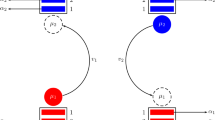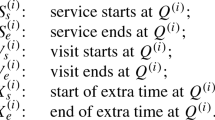Abstract
We consider multiclass Markovian polling systems with feedback and analyze their average performance measures. Scheduling in polling systems has many applications in computer and communication systems. We utilize the framework that has been effectively used to analyze various composite scheduling algorithms in many types of multiclass queues systematically in conjunction with the functional computation method (Hirayama in Naval Research Logistics 50:719–741, 2003; Journal of the Operations Research Society of Japan 48:226–255, 2005; Advances in queueing theory and network applications, pp. 119–146, Springer, New York, 2009a; Journal of Industrial and Management Optimization 6:541–568, 2010).
We define the conditional expected values of the performance measures such as the sojourn times as functions of the system state and find their expressions by solving some equations. Then from these expressions, we derive the average numbers of customers and the average sojourn times for all service stages of customers circulating the system. We consider their application to a packet scheduling problem where multiple categories of packets share a resource.
Similar content being viewed by others
References
Aalto, S., Ayesta, U., Borst, S., Misra, V., & Núñez-Queija, R. (2007). Beyond processor sharing. ACM SIGMETRICS Performance Evaluation Review, 34, 36–43.
Altman, E., Avrachenkov, K., & Ayesta, U. (2006). A survey on discriminatory processor sharing. Queueing Systems, 53, 53–63.
Baker, J. E., & Rubin, I. (1987). Polling with a general-service order table. IEEE Transactions on Communications, 35, 283–288.
Boon, M. A. A., Adan, I. J. B. F., & Boxma, O. J. (2010). A polling model with multiple priority levels. Performance Evaluation, 67, 468–484.
Boxma, O. J., Bruin, J., & Fralix, B. (2009). Sojourn times in polling systems with various service disciplines. Performance Evaluation, 66, 621–639.
Boxma, O. J., Levy, H., & Yechiali, U. (1992). Cyclic reservation schemes for efficient operation of multiple-queue single-server systems. Annals of Operations Research, 35, 187–208.
Choi, B. D., Kim, B., & Choi, S. H. (2000). On the M/G/1 Bernoulli feedback queue with multi-class customers. Computers & Operations Research, 27, 269–286.
Cooper, R. B. (1970). Queues served in cyclic order: waiting times. The Bell System Technical Journal, 49, 399–413.
Cooper, R. B., & Murray, G. (1969). Queues served in cyclic order. The Bell System Technical Journal, 48, 675–689.
Doshi, B. T., & Kaufman, J. S. (1988). Sojourn time in an M/G/1 queue with Bernoulli feedback. In O. J. Boxma & R. Syski (Eds.), Queueing theory and its applications (pp. 207–233). Amsterdam: North-Holland.
Eisenberg, M. (1972). Queues with periodic service and changeover time. Operations Research, 20, 440–451.
Ferguson, M. J., & Aminetzah, Y. J. (1985). Exact results for nonsymmetric token ring systems. IEEE Transactions on Communications, 33, 223–231.
Hirayama, T. (2003). Mean sojourn times in multiclass feedback queues with gated disciplines. Naval Research Logistics, 50, 719–741.
Hirayama, T. (2005). Multiclass polling systems with Markovian feedback: mean sojourn times in gated and exhaustive systems with local priority and FCFS service orders. Journal of the Operations Research Society of Japan, 48, 226–255.
Hirayama, T. (2009a). Markovian polling systems: functional computation for mean waiting times and its computational complexity. In W. Yue, Y. Takahashi, & H. Takagi (Eds.), Advances in queueing theory and network applications (pp. 119–146). New York: Springer.
Hirayama, T. (2009b). Multi-layered scheduling in a Markovian polling system. In Proceedings of the queueing symposium: stochastic models and their applications, Matsumoto, Japan, 21–23 January (pp. 258–267).
Hirayama, T. (2010). Analysis of multiclass feedback queues and its application to a packet scheduling problem. Journal of Industrial and Management Optimization, 6, 541–568.
Hirayama, T., Hong, S. J., & Krunz, M. M. (2004). A new approach to analysis of polling systems. Queueing Systems, 48, 135–158.
Jewkes, E. M., & Buzacott, J. A. (1991). Flow time distributions in a K class M/G/1 priority feedback queue. Queueing Systems, 8, 183–202.
Katayama, T. (1992). Performance analysis and optimization of a cyclic-service tandem queueing system with multi-class customers. Computers & Mathematics With Applications, 24, 25–33.
Kleinrock, L. (1976). Queueing systems, volume II: Computer applications. New York: Wiley.
Kleinrock, L., & Levy, H. (1988). The analysis of random polling systems. Operations Research, 36, 716–732.
Konheim, A. G., Levy, H., & Srinivasan, M. M. (1994). Descendant set: an efficient approach for the analysis of polling systems. IEEE Transactions on Communications, 42, 1245–1253.
Levy, H. (1991). Binomial-gated service: a method for effective operation and optimization of polling systems. IEEE Transactions on Communications, 39, 1341–1350.
Levy, H., & Sidi, M. (1990). Polling systems: applications, modeling, and optimization. IEEE Transactions on Communications, 38, 1750–1760.
Paterok, M., Fischer, O., & Opta, L. (1989). Feedback queues with preemption-distance priorities. ACM SIGMETRICS Performance Evaluation Review, 17, 136–145.
Resing, J. A. C. (1993). Polling systems and multitype branching processes. Queueing Systems, 13, 409–426.
Sarkar, D., & Zangwill, W. I. (1989). Expected waiting time for nonsymmetric cyclic queueing systems—exact results and applications. Management Science, 35, 1463–1474.
Sidi, M., Levy, H., & Fuhrmann, S. W. (1992). A queueing network with a single cyclically roving server. Queueing Systems, 11, 121–144.
Simon, B. (1984). Priority queues with feedback. Journal of the ACM, 31, 134–149.
Srinivasan, M. M. (1991). Nondeterministic polling systems. Management Science, 37, 667–681.
Takagi, H. (1986). Analysis of polling systems. Cambridge: The MIT Press.
Takine, T., Takagi, H., & Hasegawa, T. (1991). Sojourn times in vacation and polling systems with Bernoulli feedback. Journal of Applied Probability, 28, 422–432.
Van den Berg, J. L., Boxma, O. J., & Groenendijk, W. P. (1989). Sojourn times in the M/G/1 queue with deterministic feedback. Communications in Statistics. Stochastic Models, 5(1), 115–129.
Van der Mei, R. D. (2002). Waiting-time distributions in polling systems with simultaneous batch arrivals. Annals of Operations Research, 113, 155–173.
Wierman, A., Winands, E. M. M., & Boxma, O. J. (2007). Scheduling in polling systems. Performance Evaluation, 64, 1009–1028.
Winands, E. M. M., Adan, I. J. B. F., & Van Houtum, G. J. (2006). Mean value analysis for polling systems. Queueing Systems, 54, 35–44.
Author information
Authors and Affiliations
Corresponding author
Rights and permissions
About this article
Cite this article
Hirayama, T. Analysis of multiclass Markovian polling systems with feedback and composite scheduling algorithms. Ann Oper Res 198, 83–123 (2012). https://doi.org/10.1007/s10479-011-0910-7
Published:
Issue Date:
DOI: https://doi.org/10.1007/s10479-011-0910-7




